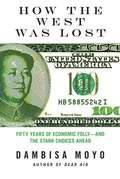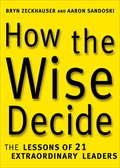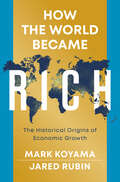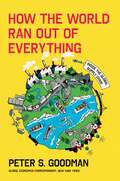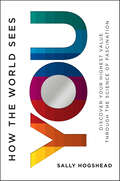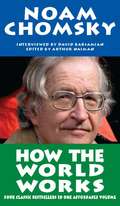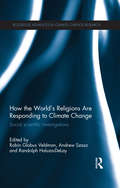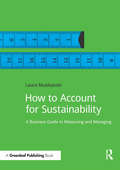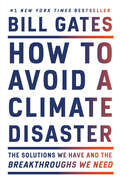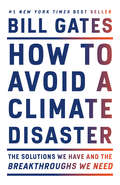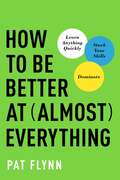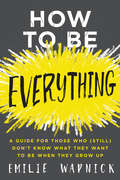- Table View
- List View
How the West Was Lost: Fifty Years of Economic Folly---And the Stark Choices Ahead
by Dambisa MoyoDambisa Moyo offers a bold account of the decline of the economic supremacy of the West. She examines how the West's flawed financial decisions and blinkered political and military choices have resulted in an economic and geopolitical seesaw that is now poised to tip in favor of the emerging world.
How the Wise Decide
by Bryn Zeckhauser Aaron SandoskiDiscover the formula used by twenty-one of the world’s most extraordinary leaders to make consistent and smart decisions. How do the wise decide and lead businesses and organizations to great success is the question Bryn Zeckhauser and Aaron Sandoski posed to themselves after landing their first jobs as managers. Despite the best training the world could offer—Harvard MBAs and stints at McKinsey & Company, the elite powerhouse consulting firm—they felt unprepared when faced with the pressure to make critical decisions. So they set out on a three-year quest to discover how people with remarkable success and experience in both corporate and public life—“the wise”—went about making crucial, often make-or-break decisions. • How did William George, when CEO of Medtronic, get the real story about why a critical tool used by cardiologists was failing and use that information to fix a systemic problem within the company? • When inventor Dean Kamen has to make a decision about investing in a new technology, why does he find it useful to “fill a room with barbarians” to get the best thinking from his team? • How did Shelly Lazarus assess the risks of making a nontraditional career move, a decision that eventually led her to being appointed CEO? • How did Stephen Schwarzman and Peter Peterson, the founders of The Blackstone Group, turn $400,000 of their own money into one of the world’s preeminent alternative asset managers with $100 billion under management? These and the other accounts of the direct conversations Zeckhauser and Sandoski had with twenty-one major leaders show that between wise decisions and poor ones lie vast fortunes and extraordinary contrasts in success. How the Wise Decidedistills their wisdom, and it reveals how you can use this wisdom to be on the winning side of the ledger. From the Hardcover edition.
How the World Became Rich: The Historical Origins of Economic Growth
by Jared Rubin Mark KoyamaMost humans are significantly richer than their ancestors. Humanity gained nearly all of its wealth in the last two centuries. How did this come to pass? How did the world become rich?Mark Koyama and Jared Rubin dive into the many theories of why modern economic growth happened when and where it did. They discuss recently advanced theories rooted in geography, politics, culture, demography, and colonialism. Pieces of each of these theories help explain key events on the path to modern riches. Why did the Industrial Revolution begin in 18th-century Britain? Why did some European countries, the US, and Japan catch up in the 19th century? Why did it take until the late 20th and 21st centuries for other countries? Why have some still not caught up?Koyama and Rubin show that the past can provide a guide for how countries can escape poverty. There are certain prerequisites that all successful economies seem to have. But there is also no panacea. A society’s past and its institutions and culture play a key role in shaping how it may – or may not – develop.
How the World Ran Out of Everything: Inside the Global Supply Chain
by Peter S. GoodmanBy the New York Times’s Global Economics Correspondent, an extraordinary journey to understand the worldwide supply chain—exposing both the fascinating pathways of manufacturing and transportation that bring products to your doorstep, and the ruthless business logic that has left local communities at the mercy of a complex and fragile network for their basic necessities."A tale that will change how you look at the world." —Mark LeibovichOne of Foreign Policy's "Most Anticipated Books of 2024"How does the wealthiest country on earth run out of protective gear in the middle of a public health catastrophe? How do its parents find themselves unable to locate crucially needed infant formula? How do its largest companies spend billions of dollars making cars that no one can drive for a lack of chips?The last few years have radically highlighted the intricacy and fragility of the global supply chain. Enormous ships were stuck at sea, warehouses overflowed, and delivery trucks stalled. The result was a scarcity of everything from breakfast cereal to medical devices, from frivolous goods to lifesaving necessities. And while the scale of the pandemic shock was unprecedented, it underscored the troubling reality that the system was fundamentally at risk of descending into chaos all along. And it still is. Sabotaged by financial interests, loss of transparency in markets, and worsening working conditions for the people tasked with keeping the gears turning, our global supply chain has become perpetually on the brink of collapse.In How the World Ran Out of Everything, award-winning journalist Peter S. Goodman reveals the fascinating innerworkings of our supply chain and the factors that have led to its constant, dangerous vulnerability. His reporting takes readers deep into the elaborate system, showcasing the triumphs and struggles of the human players who operate it—from factories in Asia and an almond grower in Northern California, to a group of striking railroad workers in Texas, to a truck driver who Goodman accompanies across hundreds of miles of the Great Plains. Through their stories, Goodman weaves a powerful argument for reforming a supply chain to become truly reliable and resilient, demanding a radical redrawing of the bargain between labor and shareholders, and deeper attention paid to how we get the things we need.From one of the most respected economic journalists working today, How the World Ran Out of Everything is a fiercely smart, deeply informative look at how our supply chain operates, and why its reform is crucial—not only to avoid dysfunction in our day to day lives, but to protect the fate of our global fortunes.
How the World Sees You: Discover Your Highest Value Through the Science of Fascination
by Sally HogsheadThis &“lively&” New York Times–bestselling book &“is worth the time of anyone trying to set him or herself apart in an ever-more competitive job market&” (Publishers Weekly). You already know how you see the world. But do you know how the world sees you? How is your personality most likely to impress and influence the person sitting on the other side of the desk or boardroom? Once you know what makes you valuable to others, you're more authentic and confident, and more able to make a positive impression. It all begins with understanding how the world sees you—at your best. How the World Sees You gives you the step-by-step method to describe yourself in just two or three words. This short phrase is your Anthem, the tagline for your personality. Your Anthem guides you like a mission statement, helping you to build your team, write a LinkedIn profile, or captivate an audience. This book includes a private code to unlock one free Fascination Advantage® Personality Test. Your customized online report, based on Sally Hogshead's extensive research on what fascinates listeners, will reveal how you fascinate others, including Your top two Fascination Advantages in communication The personality Archetypes you need on your team to optimize your success The five words to describe your personality's highest value To become more successful, you do not have to change who you are—you have to become more of who you are. How the World Sees You reveals who you are at your best so you can create better relationships, grow your business, and become intensely valuable to those who matter most.
How the World Works
by Noam Chomsky David Barsamian Arthur NaimanAccording to The New York Times, Noam Chomsky is arguably the most important intellectual alive. " But he isn't easy to read . . . or at least he wasn't until these books came along. Made up of intensively edited speeches and interviews, they offer something not found anywhere else: pure Chomsky, with every dazzling idea and penetrating insight intact, delivered in clear, accessible, reader-friendly prose. Published as four short books in the famous Real Story series---What Uncle Sam Really Wants; The Prosperous Few and the Restless Many; Secrets, Lies and Democracy; and The Common Good---they've collectively sold almost 600,000 copies. And they continue to sell year after year after year because Chomsky's ideas become, if anything, more relevant as time goes by. For example, twenty years ago he pointed out that "in 1970, about 90% of international capital was used for trade and long-term investment---more or less productive things---and 10% for speculation. By 1990, those figures had reversed. " As we know, speculation continued to increase exponentially. We're paying the price now for not heeding him them.
How the World Works: A Brief Course in Macroeconomics--And Where the Fed Fits In
by Ethan S. HarrisEven to investment professionals, macroeconomics can seem like a bewildering array of competing models. But, in the economic and policy debate at the Fed, a relatively simple framework tends to dominate discussion. In this chapter, leading economist, Ethan Harris, lays out how the Fed fits into the broader economic and financial market environment.
How the World's Religions are Responding to Climate Change: Social Scientific Investigations (Routledge Advances in Climate Change Research)
by Andrew Szasz Robin Globus Veldman Randolph Haluza-DeLayA growing chorus of voices has suggested that the world’s religions may become critical actors as the climate crisis unfolds, particularly in light of international paralysis on the issue. In recent years, many faiths have begun to address climate change and its consequences for human societies, especially the world’s poor. This is the first volume to use social science to examine how religions are helping to address one of the most significant and far-reaching challenges of our time. While there is a growing literature in theology and ethics about climate change and religion, little research has been previously published about the ways in which religious institutions, groups and individuals are responding to the problem of climate change. Seventeen research-driven chapters are written by sociologists, anthropologists, geographers and other social scientists. This book explores what effects religions are having, what barriers they are running into or creating, and what this means for the global struggle to address climate change.
How to Account for Sustainability: A Simple Guide to Measuring and Managing (Doshorts Ser.)
by Laura MusikanskiLearn how to measure, manage and account for sustainability in your business in clear, simple and feasible steps.This book takes you from concept to innovation and back to action items for all aspects of sustainability. Each chapter has four sections: (1) a specific description of sustainability challenges, (2) an example of a business making a profit by sustainability problem, (3) an exercise challenging the reader to identify business solutions and (4) clear, simple takeaways.The book is structured around the world’s most accepted guidelines for sustainability reporting, the Global Reporting Initiative.
How to Achieve Property Success
by Margaret LomasA one-stop shop for property investors - the ultimate must-have for new and experienced property investors alike.Topics covered include:- Dispelling the myths around property investing- Truths about negative gearing- Due diligence to avoid buying a lemon - Buying and selling property- Managing your property- Structuring your investments and taxation matters- Obtaining the right loan- Creating an income for life- Protecting your wealth.
How to Adopt a Balanced View of Risk: Elephants and Epidemics--Making Intersectional Ideas Happen
by Frans JohanssonWhen thinking about risk, emotions, and fear in particular, play a big part in our perception of possible loss versus potential gain. What gives some innovators, like Richard Branson of Virgin Atlantic, the courage to pursue risky ideas that emerge from the intersection of fields?
How to Afford Time Off with your Baby: 101 Ways to Ease the Financial Strain
by Becky Goddard-HillA new baby brings a great deal of excitement to a household, but managing on a reduced income can be a daunting prospect. Full of top tips and creative ideas, this practical guide will help you make the right financial decisions during your pregnancy and throughout your maternity leave - whether this is 6 weeks or 6 years!How to Afford Time Off with Your Baby will:* help you to budget at each and every stage, from pregnancy to starting school* offer guidance on the essential pieces of baby kit so you don't overbuy* propose creative ways to generate a little extra cash and achieve more with less* advise you on how to release and save money during this critical time With an extensive resource section full of up-to-date websites, activity groups and key advisors, How to Afford Time off with Your Baby is an indispensable guide that will help you worry less so you can enjoy those precious moments with your new baby much more.
How to Age In Place
by Mary A. Languirand Robert F. BornsteinThe first authoritative and comprehensive guide to "aging in place"--a burgeoning movement for those who don't want to rely on assisted living or nursing home care--which allows seniors to spend their later years living comfortably, independently, and in their own home or community. In this empowering and indispensable book, clinical psychologists and aging specialists Mary Languirand and Robert Bornstein teach readers how, with planning and foresight, they can age with dignity and comfort in the place of their own choosing. A necessary resource for seniors, their adult children, and eldercare professionals, How to Age in Place offers useful, actionable advice on financial planning; making your home physically safe; getting around; obtaining necessary services; keeping a healthy mind, body, and spirit; and post-retirement employment. How to Age in Place is both a practical roadmap and inspirational guide for the millions of seniors who want to make their own decisions and age well.
How to Analyze a Case
by William ElletA case is a text that refuses to explain itself. How do you construct a meaning for it? This chapter discusses in depth a case situation approach that identifies features of a case that can be helpful to its analysis and encourages active reading.
How to Appraise Your Organization's Capabilities and Disabilities
by Clayton M. ChristensenOrganizations, independent of the people and other resources in them, have capabilities. This chapter outlines three classes of factors that affect an organization's capabilities: resources, process, and values. The successful organization must develop or acquire the capability to embrace and respond successfully to change. This chapter was originally published as chapter 8 of "The Innovator's Dilemma: When New Technologies Cause Great Firms to Fail."
How to Architect
by Doug PattThe word "architect" is a noun, but Doug Patt uses it as a verb--coining a term and making a point about using parts of speech and parts of buildings in new ways. Changing the function of a word, or a room, can produce surprise and meaning. In How to Architect, Patt--an architect and the creator of a series of wildly popular online videos about architecture--presents the basics of architecture in A-Z form, starting with "A is for Asymmetry" (as seen in Chartres Cathedral and Frank Gehry), detouring through "N is for Narrative," and ending with "Z is for Zeal" (a quality that successful architects tend to have, even in fiction--see T he Fountainhead's architect-hero Howard Roark. ) How to Architect is a book to guide you on the road to architecture. If you are just starting on that journey or thinking about becoming an architect, it is a place to begin. If you are already an architect and want to remind yourself of what drew you to the profession, it is a book of affirmation. And if you are just curious about what goes into the design and construction of buildings, this book tells you how architects think. Patt introduces each entry with a hand-drawn letter, and accompanies the text with illustrations that illuminate the concept discussed: a fallen Humpty Dumpty illustrates the perils of fragile egos; photographs of an X-Acto knife and other hand tools remind us of architecture's nondigital origins. How to Architect offers encouragement to aspiring architects but also mounts a defense of architecture as a profession--by calling out a defiant verb: architect!
How to Architect
by Doug PattThe basics of the profession and practice of architecture, presented in illustrated A-Z form. The word "architect" is a noun, but Doug Patt uses it as a verb—coining a term and making a point about using parts of speech and parts of buildings in new ways. Changing the function of a word, or a room, can produce surprise and meaning. In How to Architect, Patt—an architect and the creator of a series of wildly popular online videos about architecture—presents the basics of architecture in A-Z form, starting with "A is for Asymmetry" (as seen in Chartres Cathedral and Frank Gehry), detouring through "N is for Narrative," and ending with "Z is for Zeal" (a quality that successful architects tend to have, even in fiction—see The Fountainhead's architect-hero Howard Roark.) How to Architect is a book to guide you on the road to architecture. If you are just starting on that journey or thinking about becoming an architect, it is a place to begin. If you are already an architect and want to remind yourself of what drew you to the profession, it is a book of affirmation. And if you are just curious about what goes into the design and construction of buildings, this book tells you how architects think. Patt introduces each entry with a hand-drawn letter, and accompanies the text with illustrations that illuminate the concept discussed: a fallen Humpty Dumpty illustrates the perils of fragile egos; photographs of an X-Acto knife and other hand tools remind us of architecture's nondigital origins. How to Architect offers encouragement to aspiring architects but also mounts a defense of architecture as a profession—by calling out a defiant verb: architect!
How to Avoid Commoditization
by Clayton M. Christensen Michael E. RaynorWhat causes commoditization, and is it the inevitable fate of all companies in competitive markets? Many executives believe that commoditization is the inevitable end-result, no matter how innovative their companies are. The purpose of this chapter is to help managers understand the reciprocal relationship between commoditization and de-commoditization so they can detect when and where they are beginning to happen. If managers understand how these processes work, they can steer their companies to where the money will be, not to profitable business models of the past.
How to Avoid Getting Lost in the Numbers
by David H. MaisterProvides some hints and tips to students who encounter difficulty in performing quantitative analyses of case studies. Describes how to approach the numbers and suggests devices they can use to overcome their problems.
How to Avoid Probate for Everyone: Protecting Your Estate for Your Loved Ones
by Ronald Farrington SharpLearn how to prepare your estate and avoid costly mistakesWant to avoid probate? Gleaned from his forty-four years as an estate attorney, Sharp describes the probate process and the many reasons why it should be your last resort in estate settlement methods in How to Avoid Probate for Everyone. Living trusts are important, but there are many alternatives to using a living trust for probate avoidance. These alternatives are explained step-by-step as Sharp delves into the details. Examples of such approaches include:While state laws vary, most allow for expedited procedures for low-value estates without having to create a trust.There are a dozen different ways of leaving assets to heirs automatically at death.Special types of deeds allow you to keep control of your real estate during lifetime yet transfer it to heirs automatically at death.There are several ways of titling vehicles that allow heirs to get them without court procedures.Beneficiary designations on bank and investment accounts keep them out of your probate estate.Joint ownership of accounts and real estate can solve inheritance problems.Common myths and misconceptions about estates and probate are debunked. Trusts are covered in detail, including a section on must-use trust provisions to cover common complications and showing how a trust can easily resolve these. Joint and single trusts are examined and issues, such as how to handle personal property items, are suggested. (For instance, who gets the piano?) By avoiding probate court-supervised adult guardianship and conservatorship, families can avoid embarrassing and time-consuming incompetency hearings in court. Samples of the described documents are also included to give the reader an idea of what the paperwork actually looks like. Sharp&’s matter-of-fact explanations will prepare any reader to take the necessary steps to prepare their estate with confidence and avoid probate.
How to Avoid a Climate Disaster: The Solutions We Have and the Breakthroughs We Need
by Bill GatesIn this urgent, singularly authoritative book, Bill Gates sets out a wide-ranging, practical--and accessible--plan for how the world can get to zero greenhouse gas emissions in time to avoid an irreversibleclimate catastrophe.Bill Gates has spent a decade investigating the causes and effects of climate change. With the help and guidance of experts in the fields of physics, chemistry, biology, engineering, political science and finance, he has focused on exactly what must be done in order to stop the planet's slide toward certain environmental disaster. In this book, he not only gathers together all the information we need to fully grasp how important it is that we work towardnet-zero emissions of greenhouse gases but also details exactly what we need to do to achieve this profoundly important goal. He gives us a clear-eyed description of the challenges we face. He describes the areas in which technology is already helping to reduce emissions; where and how the current technology can be made to function more effectively; where breakthrough technologies are needed, and who is working on these essential innovations. Finally, he lays out a concrete plan for achieving the goal of zero emissions--suggesting not only policies that governments should adopt, but what we as individuals can do to keep our government, our employers and ourselves accountable in this crucial enterprise.As Bill Gates makes clear, achieving zero emissions will not be simple or easy to do, but by following the guidelines he sets out here, it is a goal firmly within our reach.
How to Avoid a Climate Disaster: The Solutions We Have and the Breakthroughs We Need
by Bill GatesIn this urgent, authoritative book, Bill Gates sets out a wide-ranging, practical--and accessible--plan for how the world can get to zero greenhouse gas emissions in time to avoid a climate catastrophe. <P><P>Bill Gates has spent a decade investigating the causes and effects of climate change. With the help of experts in the fields of physics, chemistry, biology, engineering, political science, and finance, he has focused on what must be done in order to stop the planet's slide to certain environmental disaster. In this book, he not only explains why we need to work toward net-zero emissions of greenhouse gases, but also details what we need to do to achieve this profoundly important goal. <P><P>He gives us a clear-eyed description of the challenges we face. Drawing on his understanding of innovation and what it takes to get new ideas into the market, he describes the areas in which technology is already helping to reduce emissions, where and how the current technology can be made to function more effectively, where breakthrough technologies are needed, and who is working on these essential innovations. Finally, he lays out a concrete, practical plan for achieving the goal of zero emissions--suggesting not only policies that governments should adopt, but what we as individuals can do to keep our government, our employers, and ourselves accountable in this crucial enterprise. <P><P>As Bill Gates makes clear, achieving zero emissions will not be simple or easy to do, but if we follow the plan he sets out here, it is a goal firmly within our reach. <P><P><b>A New York Times Bestseller</b>
How to Avoid the Ten Biggest Home-Buying Traps
by Patrick Hogan A. M. WatkinsBuying a house can be a wonderful experience if you understand not only what to buy, but also what not to buy. But can you avoid common homebuying mistakes if you don't know what they are? Let How to Avoid the 10 Biggest Homebuying Traps guide you safely through the process of buying your home by showing you what pitfalls to identify and sidestep. With this guidance, you can successfully navigate potential money traps to find the home of your dreams. How To Avoid the 10 Biggest Homebuying Traps reveals the ten most common, and costly, mistakes homebuyers make. Guided by real estate expert Art Watkins, you'll learn how to spot and avoid: Houses that are overpriced for their value New construction by shady builders Homes that are marginal in quality Houses packed with special features for an impulse buy Garbled floor plans that reduce a home's value Homes that are expensive energy guzzlers, and much more.
How to Be Better at Almost Everything: Learn Anything Quickly, Stack Your Skills, Dominate
by Pat FlynnMastering one specific skill set might have been the key to success 20 years ago . . . but being the best at a single thing just doesn't cut it in today's global economy. Think about those people who somehow manage to be amazing at everything they do—the multimillionaire CEO with the bodybuilder physique or the rock star with legions of adoring fans. How do they manage to be so great at life? By acquiring and applying multiple skills to make themselves more valuable to others, they've become generalists, able to "stack" their varied skills for a unique competitive edge. In How to Be Better at Almost Everything, bestselling author, fitness expert, entrepreneur, and professional business coach Pat Flynn shares the secrets to learning (almost) every skill, from marketing and music to relationships and martial arts, teaching how to combine interests to achieve greatness in any field. Discover how to: Learn any skill with only an hour of practice a day through repetition and resistance Package all your passions into a single tool kit for success with skill stacking Turn those passions into paychecks by transforming yourself into a person of interest To really get ahead in today's fast-paced, constantly evolving world, you need a diverse portfolio of hidden talents you can pull from your back pocket at a moment's notice. The good news? You don't need to be a genius or a prodigy to get there—you just have to be willing to learn. How to Be Better at Almost Everything will teach you how to make your personal and professional goals a reality, starting today.
How to Be Everything: A Guide for Those Who (Still) Don't Know What They Want to Be When They Grow Up
by Emilie WapnickWhat do you want to be when you grow up? It's a familiar question we're all asked as kids. While seemingly harmless, the question has unintended consequences. It can make you feel like you need to choose one job, one passion, one thing to be about. Guess what? You don't. Having a lot of different interests, projects and curiosities doesn't make you a "jack-of-all-trades, master of none." Your endless curiosity doesn't mean you are broken or flaky. What you are is a multipotentialite: someone with many interests and creative pursuits. And that is actually your biggest strength.How to Be Everything helps you channel your diverse passions and skills to work for you. Based on her popular TED talk, "Why some of us don't have one true calling", Emilie Wapnick flips the script on conventional career advice. Instead of suggesting that you specialize, choose a niche or accumulate 10,000 hours of practice in a single area, Wapnick provides a practical framework for building a sustainable life around ALL of your passions.You'll discover:• Why your multipotentiality is your biggest strength, especially in today's uncertain job market.• How to make a living and structure your work if you have many skills and interests.• How to focus on multiple projects and make progress on all of them.• How to handle common insecurities such as the fear of not being the best, the guilt associated with losing interest in something you used to love and the challenge of explaining "what you do" to others. Not fitting neatly into a box can be a beautiful thing. How to Be Everything teaches you how to design a life, at any age and stage of your career, that allows you to be fully you, and find the kind of work you'll love.
